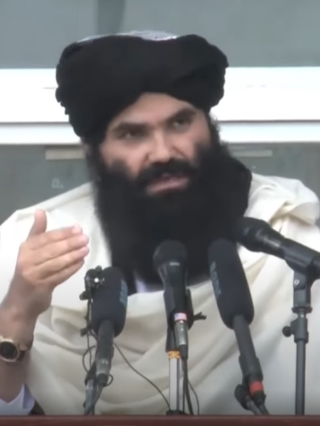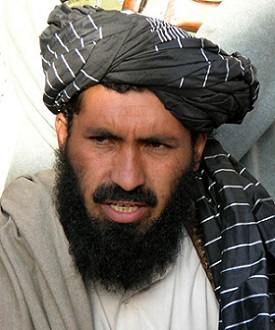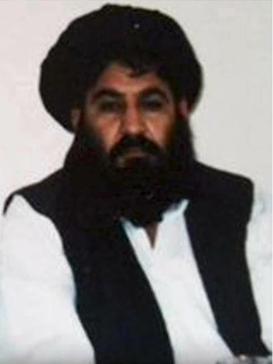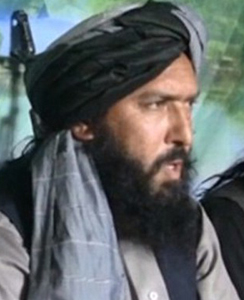
Muhammad Omar was an Afghan militant leader and founder of the Taliban. During the Third Afghan Civil War, the Taliban fought the Northern Alliance and took control of most of the country, establishing the First Islamic Emirate for which Omar began to serve as Supreme Leader in 1996. Shortly after al-Qaeda carried out the September 11 attacks, the Taliban government was toppled by an American invasion of Afghanistan, prompting Omar to go into hiding. He successfully evaded capture by the American-led coalition before dying in 2013 from tuberculosis.

The Islamic Movement of Uzbekistan was a militant Islamist group formed in 1998 by Islamic ideologue Tahir Yuldashev and former Soviet paratrooper Juma Namangani; both ethnic Uzbeks from the Fergana Valley. Its original objective was to overthrow President Islam Karimov of Uzbekistan and create an Islamic state under Sharia; however, in subsequent years, it reinvented itself as an ally of Al-Qaeda. The group also maintained relations with Afghan Taliban in 1990s. However, later on, relations between the Afghan Taliban and the IMU started declining.

Sirajuddin Haqqani is an Afghan warlord who is the first deputy leader of Afghanistan and the acting interior minister. He has been a deputy leader of the Taliban since 2015, and was additionally appointed to his ministerial role after the Taliban's victory over Western-backed forces in the 2001–2021 war. He has led the Haqqani network, a semi-autonomous paramilitary arm of the Taliban, since inheriting it from his father in 2018, and has primarily had military responsibilities within the Taliban.

Mullah Mansoor Dadullah was Mullah Dadullah's younger half-brother who succeeded him as a senior military commander of the Taliban in southern Afghanistan. He came from the Arghandab district of Kandahar province, and belonged to the Kakar Pashtun tribe.

The Pakistani Taliban, formally called the Tehreek-e-Taliban-e-Pakistan, is an umbrella organization of various Islamist armed militant groups operating along the Afghan–Pakistani border. Formed in 2007 by Baitullah Mehsud, its current leader is Noor Wali Mehsud, who has publicly pledged allegiance to the Afghan Taliban. The Pakistani Taliban share a common ideology with the Afghan Taliban and have assisted them in the 2001–2021 war, but the two groups have separate operation and command structures.

Maulvi Nazir was a leading militant of the Pakistani Taliban in South Waziristan. Nazir's operations were based in Wana.
Omar Khalid Khorasani was a Pakistani militant and one of the founding members of Tehreek-i-Taliban Pakistan (TTP). In 2014, he formed his own splinter militant group called Jamaat-ul-Ahrar (JuA) and was ousted by the Mullah Fazlullah-led Taliban. The same year, JuA swore allegiance to Islamic State (ISIS), however, a year later JuA rejoined TTP.
On 8 June 2014, 10 militants armed with automatic weapons, a rocket launcher, suicide vests, and grenades attacked Jinnah International Airport in Karachi, Pakistan. 36 people were killed, including all 10 attackers, and 18 others were wounded. The militant organisation Tehrik-i-Taliban Pakistan (TTP) initially claimed responsibility for the attack. According to state media, the attackers were foreigners of Uzbek origin who belonged to the Islamic Movement of Uzbekistan (IMU), an Al Qaeda-linked militant organisation that works closely with TTP. The TTP later confirmed that the attack was a joint operation they executed with the IMU, who independently admitted to having supplied personnel for the attack.

Jamaat-ul-Ahrar was a terrorist organization that split away from Tehrik-i-Taliban Pakistan in August 2014. The group came to prominence after it claimed responsibility for the 2014 Wagah border suicide attack. In August 2020, it merged back to TTP.

The Islamic State (IS) had its core in Iraq and Syria from 2013 to 2017 and 2019 respectively, where the proto-state controlled significant swathes of urban, rural, and desert territory, mainly in the Mesopotamian region. Today the group controls scattered pockets of land in the area, as well as territory or insurgent cells in other areas, notably Afghanistan, West Africa, the Sahara, Somalia, Mozambique, and the Democratic Republic of the Congo. As of 2023, large swathes of Mali have fallen under IS control.

Akhtar Mohammad Mansour was the second supreme leader of the Taliban. Succeeding the founding leader, Mullah Omar, he was the supreme leader from July 2015 to May 2016, when he was killed in a US drone strike in Balochistan, Pakistan.

The Sacrifice Front, more commonly known as Fidai Mahaz, was a Taliban splinter group and faction in the War in Afghanistan. It was led by Mullah Najibullah, also known as Omar Khitab, a former Taliban commander.

The Islamic State – Khorasan Province is a regional branch of the Salafi jihadist group Islamic State (IS) active in South-Central Asia, primarily Afghanistan and Pakistan. ISIS–K seeks to destabilize and replace current governments within historic Khorasan region with the goal of establishing a caliphate across South and Central Asia, governed under a strict interpretation of Islamic sharia law, which they plan to expand beyond the region.
Mullah Mohammad Yaqoob Mujahid is an Afghan commander and cleric who is the second deputy leader of Afghanistan and the acting defense minister. He has been a deputy leader of the Taliban since 2016, and was additionally appointed to his ministerial role after the Taliban's victory over Western-backed forces in the 2001–2021 war. He has been the Taliban's military chief since 2020.

Hafiz Saeed Khan, also known as Mullah Saeed Orakzai, Shaykh Hafidh Sa'id Khan, or Maulvi Saeed Khan, was an Islamic militant and emir for the Islamic State – Khorasan Province (ISIS–K) from January 2015 until his death in July 2016. Prior to 2015, Khan fought with the Afghan Taliban against NATO forces in Afghanistan, joined the Islamic militant group Tehrik-e Taliban Pakistan (TTP) as a senior commander, and later swore allegiance to ISIS caliph Abu Bakr al-Baghdadi, established ISIS–K in Afghanistan as the province's first emir until his death in an American strike.

The Islamic State–Taliban conflict is an ongoing armed conflict between the Islamic State Khorasan Province (IS-KP) and the Taliban regime in Afghanistan. The conflict initially began when both operated as insurgent groups in Nangarhar; since the creation of the Taliban's emirate in 2021, IS-KP have targeted and assassinated Taliban members using hit-and-run tactics. The group have also caused incidents and attacks across the border in Pakistan.

Mufti Noor Wali Mehsud, also known as Abu Mansoor Asim, is a Pakistani Islamic scholar, cleric and jurist who is the 4th emir of the Pakistani Taliban. On 22 June 2018, Mehsud was appointed as the emir of TTP after the assassination of former emir Mullah Fazlullah in a US drone strike in Kunar, Afghanistan.

High Council of the Islamic Emirate of Afghanistan (HCIEA) (Pashto: دٙ اَفغانِستان اِسلامي اِمارَت عالي شوریٰ, romanized: Də Afġānistān Islāmī Imārat Ālī Šūrā ; Dari: شُورٰایِ عٰالئِ اِمٰارَتِ اِسلٰامئِ اَفغٰانِستٰان, romanized: Šūrā-yi Ālī-yi Imārat-i Islāmī-yi Afġānistān) was a breakaway Taliban faction active in Afghanistan since 2015. The faction broke away from the Taliban in 2015 following the appointment of Akhtar Mansour as the leader of the Taliban and elected Muhammad Rasul as its leader. The faction was involved in deadly clashes with mainstream Taliban in southern and western Afghanistan, leaving scores of dead on both sides. The Islamic Republic of Afghanistan allegedly provided financial and military support to the faction, however, both the Islamic Republic and the faction denied this. Following the Taliban offensive of 2021 and the fall of Afghanistan to Taliban forces, the group dissolved, and its leaders pledged allegiance to the new government.
On 21 May 2016, Akhtar Mansour was killed in a U.S. military drone strike on the N-40 National Highway in Pakistan near Ahmad Wal, not far from the Pakistan–Afghanistan border; Mansour had crossed earlier that day from Iran into Pakistan through the Taftan, Balochistan, border crossing, some 450 kilometres (280 mi) away from the spot where he was killed.

The Islamic State – Khorasan Province (ISIS–K) is a regional branch of the Islamic State terrorist group active in South-Central Asia, primarily Afghanistan. ISIS–K seeks to destabilize and overthrow existing governments of the historic Khorasan region to establish an Islamic caliphate under its strict, fundamentalist Islamist rule.











